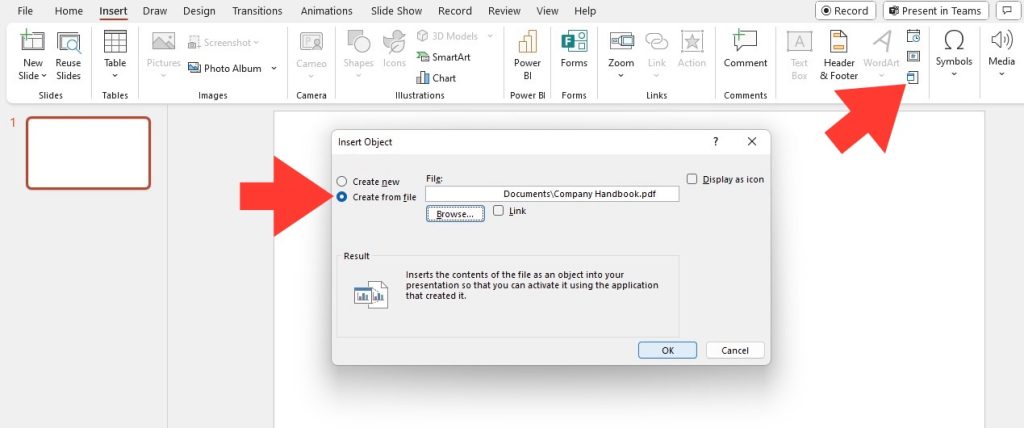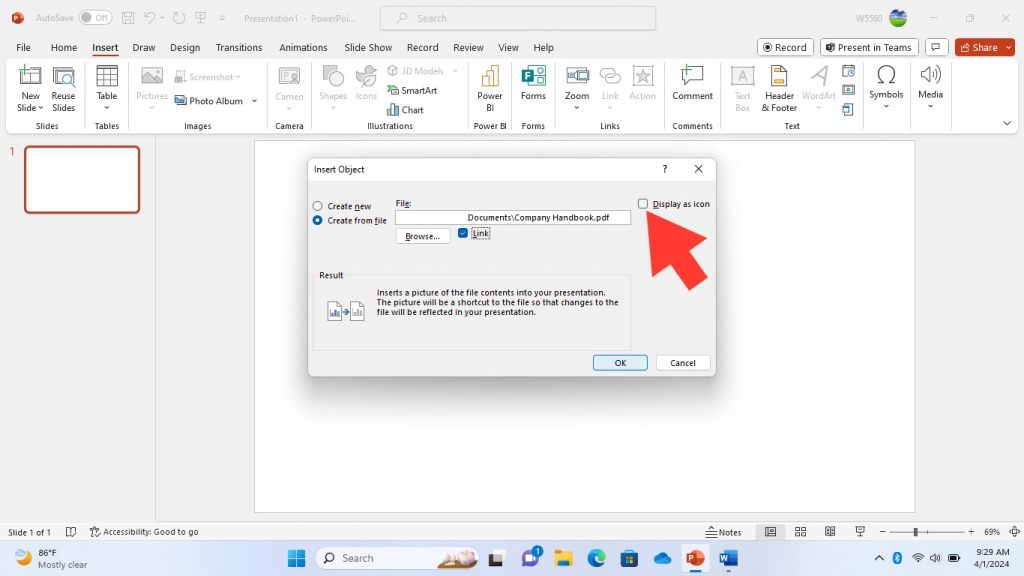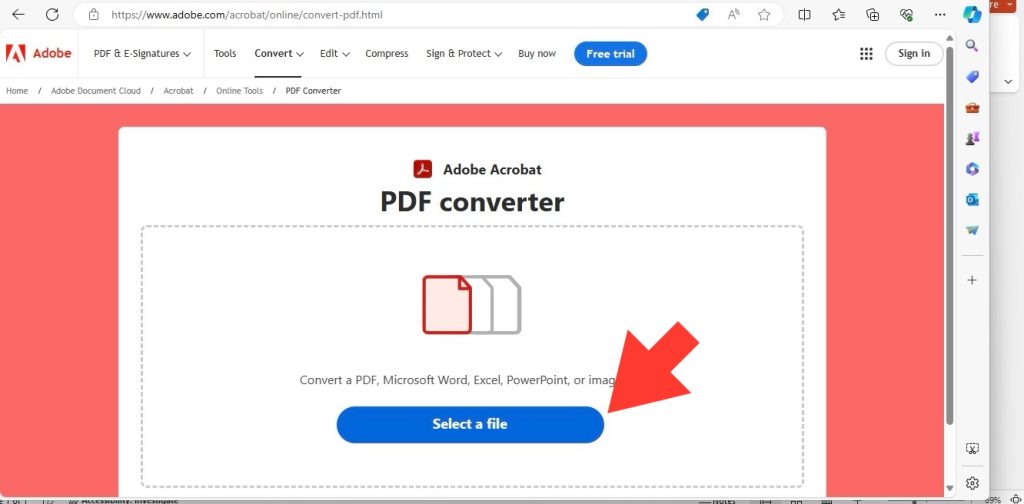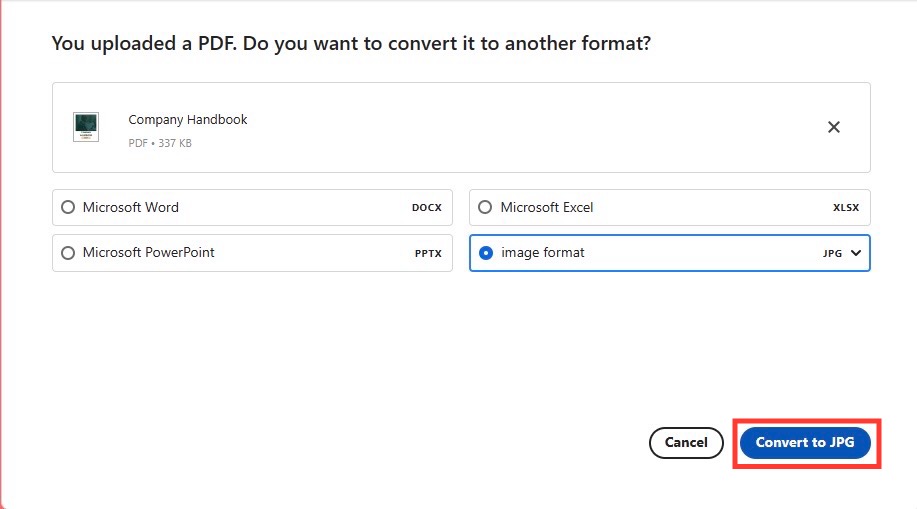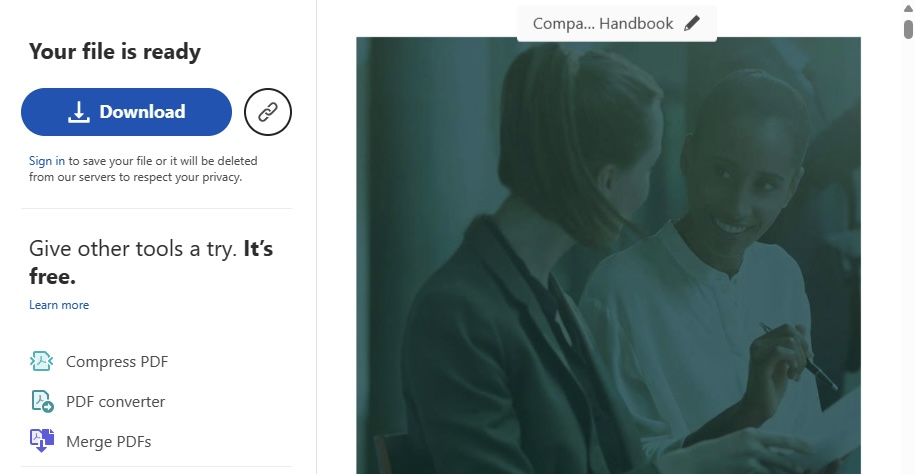Introduction to Mastering PDF to PowerPoint Conversion
Welcome to the world of presentations, where merging the clarity of PDFs with the dynamism of PowerPoint slides can transform your communication! Understanding how to effectively convert and insert PDFs into a presentation is an invaluable skill that can elevate your ability to share information. Let’s delve into the art of harmonizing these two formats.
Download our 141 Free Excel Templates and Spreadsheets!
Key Takeaways
- Use the “Insert” function in PowerPoint to add a PDF: Open your PowerPoint file, go to the “Insert” tab, select “Object,” then “From File” to choose and insert the desired PDF document into your presentation.
- Insert PDF as an object for quick access: Make sure the PDF file is closed, insert it as an object in PowerPoint, and you can double-click it to open and view the PDF directly within the presentation.
- Customize the PDF display in PowerPoint: You can choose to display the first page of the inserted PDF directly on the slide or use the “Display as icon” option to represent the PDF as an icon on the slide for a cleaner look.
What You’ll Gain by Following These Simple Insertion Tips
By mastering the simple insertion tips provided here, you’ll unlock a treasure trove of benefits. Your presentations will exhibit a professional sheen that only the combo of PDF clarity and PowerPoint dynamism can provide. Expect to save time, reduce stress, and impress your audience with sleek graphics and data-rich PDF content seamlessly integrated into your slides. With easy-to-follow steps, you’re about to become a presentation maestro!
Preparing Your PDF Document
Before you begin embedding your PDF into PowerPoint, ensuring that it’s presentation-ready is crucial. Start by fine-tuning your document:
- Proofread Content: Eliminate any spelling or grammatical errors. The last thing you want is a typo on the big screen!
- Condense Information: Simplify and summarize where possible. Text-heavy PDFs can overwhelm your PowerPoint slide.
- Optimize Images and Graphs: High-resolution images are ideal, but balance quality with file size to avoid slowing down your presentation.
Remember, a neatly organized and error-free PDF will make a significant impact when displayed in your PowerPoint slides.
Choosing the Right Conversion Tool
With a multitude of conversion tools available, selecting the right one is as essential as preparing your document. Look for these features to make a wise choice:
- User-Friendly Interface: A straightforward, intuitive process saves time and frustration.
- Quality Retention: The tool should retain the integrity of your original PDF post-conversion.
- Selective Conversion: Opt for one that allows you to convert specific pages or sections.
- Editing Capabilities: Bonus points for tools that let you tweak the PDF before converting.
- Compatibility: Ensure the software works well with your operating system.
Adobe Acrobat is a reliable option as it’s from the PDF format’s inventors, guaranteeing high-quality results. For Mac users, PDFelement Pro offers robust features tailored for macOS.
Table of Contents
Seamless Insertion Techniques
Insert a PDF into PowerPoint as an Image
If your goal is to include a static snapshot of a PDF page into your presentation, treating it as an image is the way to go. It’s relatively straightforward:
STEP 1: Open your PDF and navigate to the desired page.
STEP 2: Open PowerPoint and select the right slide for insertion.
STEP 3: Choose Insert > Screenshot, then select the open PDF window.
STEP 4: Click the PDF page image to insert it into the slide.
Now, your PDF appears as a crisp, clear image, perfect for single-page visual integration.
Insert a PDF into PowerPoint as an Object
Inserting a PDF as an object into your presentation is a neat trick to keep your content interactive without leaving the slideshow. Follow these steps:
STEP 1: Open PowerPoint and navigate to the slide where you want the PDF.
STEP 2: Go to the Insert tab and click on Object in the Text group to open the dialog box.
STEP 3: Choose Create from file, then click Browse to find and select the intended PDF and hit OK.
STEP 4: In the Insert Object dialog box, decide if you’d like to link to the PDF or just embed it. Linking means updates to the source file will reflect in your presentation—ideal for dynamic content.
STEP 5: Click OK again, and the first page of your PDF will appear on the slide.
You’ve now successfully added more depth to your PowerPoint with the comprehensive information from your PDF!
Tip: If you get an error when trying to attach the PDF file as an object, make sure you do not have the original file open.
Advanced Tips for Perfect Integration
How to Maintain Quality When Converting
Converting PDFs for PowerPoint while maintaining their original quality is essential. Here are some tips to achieve high fidelity results:
- Use Acrobat Tools: Adobe Acrobat is renowned for its ability to convert files while preserving layout and formatting.
- Review Your Settings: Before conversion, check the preferences in your conversion tool to ensure it’s set to retain quality.
- Mind the File Size: Heavier PDFs might affect quality post-conversion; consider optimizing the PDF file size.
Though slight quality loss can occur, especially with larger files, Acrobat ensures the least possible impact, keeping readability intact.
Troubleshooting Common Issues
Addressing Problems with Formatting
Formatting issues between PDFs and PowerPoint can be a hiccup, but they can often be solved with a few steps:
- Recheck Conversion Settings: Before initiating the conversion, ensure the chosen settings don’t alter the layout.
- Patch Up Post-Conversion: If formatting issues slip through, manually adjust them within PowerPoint.
- Convert to Compatible Formats First: Sometimes, converting PDFs into formats like JPEG before PPT can preserve layouts better.
- Use Premium Tools: Investing in professional conversion software can significantly decrease compatibility issues.
Remember, a keen eye for detail will help keep those pesky formatting gremlins at bay.
Solving Compatibility and Linking Errors
Facing compatibility or linking errors between your PDF content and PowerPoint can be frustrating. Tackle these issues with the following strategies:
- Update Your Software: Make sure both your PDF reader and PowerPoint are running on the latest version.
- Re-establish Links: If embedded links break during conversion, re-insert them directly in PowerPoint.
- Embed Fonts: Ensure the fonts used in the PDF are available on the computer running the presentation or embed them into the PDF.
- Test on Different Devices: Sometimes errors are device-specific. Test your presentation on another device to identify compatibility issues.
- Resort to the Object Route: Instead of embedding the entire PDF, insert it as an object that links to the file on your device.
These pointers should help clear those roadblocks, ensuring a smooth experience for your audience.
Boosting Your Presentation with PDF Content
Benefits of Using PDF Information in PowerPoint
Integrating PDFs into your PowerPoint presentations is not just about visual appeal—it offers a range of benefits:
- Enhanced Engagement: Diverse content formats keep your audience focused.
- Higher Credibility: Official documents or data sheets lend weight to your arguments.
- Streamlined Sharing: PDFs within PowerPoint make information dissemination concise.
- Versatility: Incorporate various media types, from text to high-quality images.
- Efficiency: Save time by directly using existing content without reconstruction.
Leverage these advantages to elevate your presentations from basic outlines to compelling showcases of information.
Creative Ways to Leverage PDF Content in Slides
Take your PowerPoint presentations beyond mere text and bullet points by creatively using PDF content:
- Infographics: Summarize PDF data into an infographic for a visually captivating and easy-to-understand format.
- Interactive Elements: Insert clickable PDF content that can open up additional resources when clicked.
- Animated Quotes: Animate quotes from a PDF to add emphasis and engagement.
- Step-By-Step Guides: Use multi-page PDFs to create a visual step-by-step guide throughout your slideshow.
- Portfolio Showcases: For designers or artists, include PDFs of work as high-quality images within your slides for a mini-portfolio.
Embrace these innovative ways to work PDF magic into PowerPoint for a presentation that resonates with flair and substance.
FAQs
Can I convert a PDF to PowerPoint without any software?
Yes, you can convert a PDF to PowerPoint without downloading any software by using online conversion tools. Adobe’s Acrobat online converter, for example, allows you to convert PDFs to PowerPoint easily right from your web browser, requiring only an internet connection. Each PDF page is turned into an individual PowerPoint slide, maintaining the document formatting for consistency across platforms.
How do I maintain hyperlinks when converting a PDF to a PowerPoint presentation?
To maintain hyperlinks when converting a PDF to a PowerPoint presentation, ensure the conversion tool you select can preserve links. Adobe Acrobat is known for this capability. After conversion, always double-check the hyperlinks in PowerPoint to confirm they’re active. If necessary, manually reinsert any links that didn’t carry over during conversion to make sure all your resources are accessible.
How to convert a PDF to JPG?
To convert a PDF to JPG, you can use a PDF conversion tool like Adobe Acrobat or an online service. Follow these general steps:
STEP 1: Open the PDF in the conversion software or upload it to the online converter.
STEP 2: Choose the ‘Export’ or ‘Convert’ option and select ‘Image’ followed by the JPG format.
STEP 3: Specify page range if you don’t want to convert the entire document.
STEP 4: Click ‘Export’ or ‘Convert’ to start the process, and then download your JPG file(s) once completed.
Remember to check the image quality before using it further.
John Michaloudis is a former accountant and finance analyst at General Electric, a Microsoft MVP since 2020, an Amazon #1 bestselling author of 4 Microsoft Excel books and teacher of Microsoft Excel & Office over at his flagship Academy Online Course.

